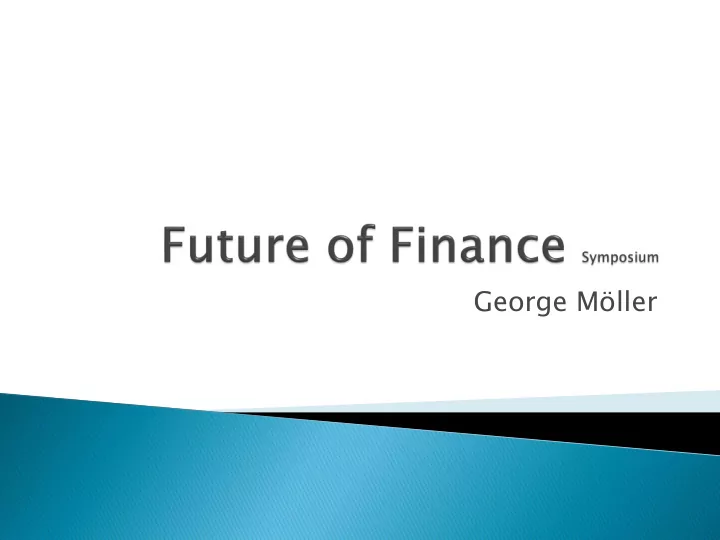

George Möller
Yes, provided we don’t mess up again. What have we learned, and what have we let go of? The perfect storm was perfect, but not a storm. The economic assumptions underlying our models are too simplistic and grossly inadequate. People are not rational. Given that, what are they? Markets are liquid most of the time but not always, and black swans come along when we don’t want. People fail to maximise utilities but do maximise things such as power. All of these topics are the territory of behavioural finance.
Economics was once a moral science, then it became a mechanical science, if not more. ‘ The tower and the stone’ Morality became unfashionable (a given). Unethical behaviour was a major cause of the crisis. Rational people can be immoral. Immoral people can be extremely rational. Is immorality wrong?
Immoral behaviour leads to wealth creation (Mandeville). The invisible hand will correct behaviour, and make it more moral and less immoral (Smith). The lack of moral behaviour needs to be addressed at an institutional level. Moral behaviour is behaviour that ensures the survival of an individual or a group. Issues include conflicts between the short-term good and long-term good, between what is good for the individual and what is good for the group (and which group), and between groups (fairness).
Which is worse: dumping toxic waste on land or at sea, or even in the air? What is the difference between (1) a fully funded pension system, (2) a pay-as-you-go pension system and (3) a Ponzi scheme? Why is the exhaust pipe always located at the back of a car, even when the engine is at the front? Harvard students and the Harvard trust discussion Thomas Piketty ‘ Capital in the Twenty-First Century (2013)
Yes/no or… don’t know It comes down to institutional factors.
Empathy and relationship between producer and consumer Financial markets are abstract. Financial markets are leveraged. If you love bread you become a baker, if you love money you become....
Economics is a linear science: we add amounts up and call the total an aggregate (gross, e.g. GDP) Economics involves simplifying: cetrus paribus. Theory of complexity: 1) aggregation creates new problems (we all sell) 2) aggregation results in behaviour that is emergent The behaviour of complex systems cannot be arrived by adding up, which we should have known. Dutch and English football hooligans (≠ ∑individual football fans) What if everybody uses the same risk systems? A model implosion? Basel, here I come. LTCM and the impact on the price of German and UK debt
Everybody does the same thing, so behaviour is not distributed normally. Emergent behaviour from system; beyond our scope. Regulation: 1) prudential only 2) behavioural 3) systemic Consequently, issues concerning behaviour, ethics and complexity have been overlooked.
Sometimes the financial markets are the source of misery ( subprime crisis ). Sometimes the financial markets are culprits ( money laundering ). Sometimes the financial markets act as healers ( credit rating agency versus France and the UK) .
Use principles and move away from rules, i.e. bring ethics back. Use empathy as a key tool: confront people with the consequences of their behaviour (bonuses are only a proxy). Combine internal norms with external standards. Apply checks and balances; everybody must have a boss. Reinstate systemic risk management. Make economics a moral science once more.
end
Recommend
More recommend